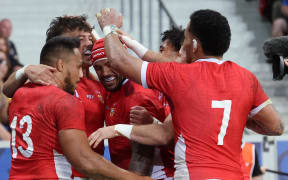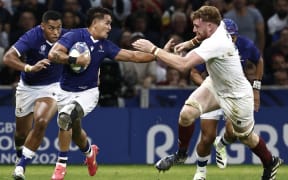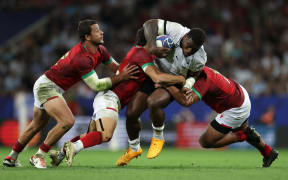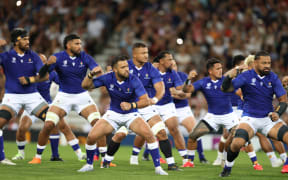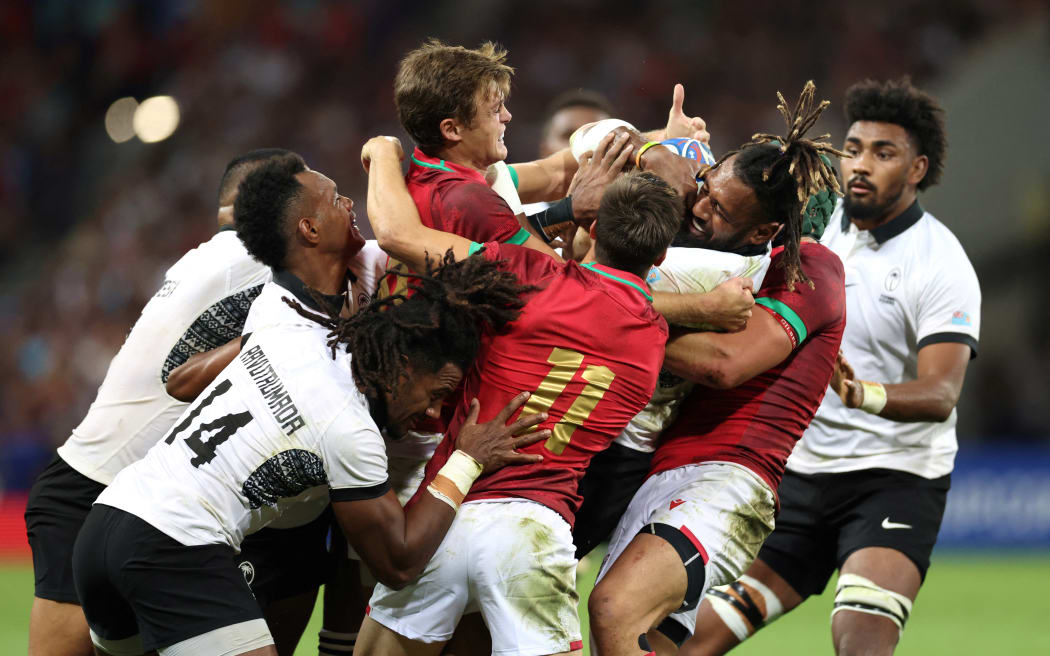
Fiji's centre Waisea Nayacalevu holds onto the ball in a maul during the France 2023 Rugby World Cup Pool C match between Fiji and Portugal at the Stade de Toulouse in Toulouse, southwestern France on 8 October. Photo: AFP
Analysis - A key talking point of France 2023 has been that, with respect to the colossal Ireland/South Africa slugfest, the best matches so far - and definitely the most fun and entertaining - involved Tier 2 teams.
The final weekend of matches only served to highlight this. Every match on Saturday and Sunday with Tier 2 teams was riveting.
The Argentina/Japan elimination game looked like it could go either way. Samoa/England will probably wind up the most controversial game of the tournament. Tonga/Romania had the joyful looseness of a high school game, and some wonderfully audacious trys kept Romania right in it up until the last 10.
Then Portugal pulled off the tournament's biggest upset so far by beating fan favourites Fiji, securing their first ever win in a World Cup match.
I asked Romania's coach, Eugen Apjok about if he would want World Rugby to help his team have more matches agains teams like Tonga.
"Yeah, for sure. We have a meeting in July in Paris, and before that in London, and everybody speaks the same things; 'it's very hard to compete after four years if you don't have any games like this'. So it's very hard not just for us, but also all Tier 2 countries."
Tongan coach Toutai Kefu echoed that sentiment a few minutes later: "We played six games a year, and maybe one or two Tier 1 teams in that block. What do the Tier 1 teams play? Nearly 15? 20? So it's hard to compete against teams that are real well oiled machines."
Both men were experienced coaches who were not just complaining as they exit the tournament. In fact they were not really complaining at all. They were simply stating how things are.
"My teams not geared up to win because of the system that we're in," said a resigned Kefu.
"So I've got to decide 'what's winning look like when you're not winning'."
The night before, in the wake of their one point loss to England, Samoan coach Selala Mapasua was adamant change needed to occur.
"It's not a coincidence that we're playing our best by the fourth game. I think we seriously need to have a look at our programme, both internally and on the global scale..."
With the Rugby Championship and Six Nations tournaments providing consistent Tier 1 tests for 7 of the 8 quater-finalists, I asked him if Samoa had any Tier 1 matches in the future.
"I haven't been informed of any fixtures that have been confirmed. I think a lot it is to do with where you finish up here at the World Cup."
Ajok summarised the frustration of Tier 2 teams attempting to grow under that kind of system.
"I remember in 2015 we had asked for years to play a game with a Tier 1, and then we had two games in four days - France and Ireland. Now in the first three games we meet South Africa, Ireland, and Scotland."
Many players across the Tier 2 teams, including Steven Luatua, Charles Piutau, (Romanian captain) Mihai Macovei, Theo McFarland, Ben Tameifuna, and (Portuguese captain) Tomás Appleton have indicated their sides should be getting more and better match ups.
"Everyone knows that in rugby, one needs to play against teams at a certain high level to flourish." said Patrice Lagisquet, coach of Portugal after stunning Fiji.
"I would say honestly that the great nations need to bring money ... at some point we have to face an economic reality."
Perhaps it was that understanding of the lack of resources Tier 2 teams face that lead Fijian coach Simon Raiwalui to enter Portugals changing room after the match with a special gift from his squad; a team bag full of kit and memorabilia for the mostly amateur Os Lobos.
Samoa also quietly gifted England their teams Nifo Oti to mark the occasion of the rare match. England, for their part, have refrained from discussing how Tier 2 teams can be helped. It has started to be noticed.
A team like Tonga operates with a budget of around T$3 million including funding help from World Rugby. By contrast, England's new player contracts are reportedly worth around £32m or T$93m.
"Look I don't begrudge those players, they get paid well." said Toutai Kefu.
"But it is, in terms, if you relate that back to resources, it's very unfair. It's hard to, you know - it's not a level playing field ... players lose money when they come play for us, so we certainly don't want to be a big burden between World Cups."
The fact Tier 2 teams were worried about financially burdening their players will be a major point for World Rugby to address before Australia 2027.
For now, only Fiji remained, supported not just by their nation, but Tier 2 fans around the world.
